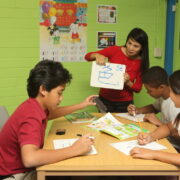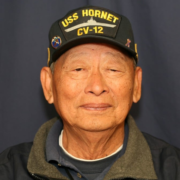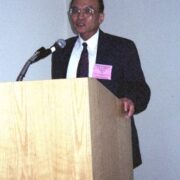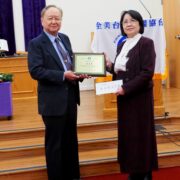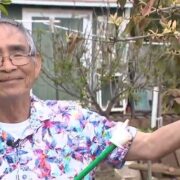迷失在競爭學路上
作者 林天德
就我所能想起,我從小最被期待的,莫過於書要唸得好。在還沒正式進入小學之前,算是日治時代,村裡就近請一位從北部來討吃的婦女充當幼稚園老師。這是不必登記的幼稚園,幼童都是臨時拼措,老師也是臨時聘請。記得我和幾位小朋友每天挑個竹凳子,聽從老師指示。這邊坐坐,那邊站站,就開始學日語,唱日本歌,哼「國民學校一年生」。那曉得不到一年,河山變色,世界大戰結束,我被送進「林邊國民小學」開始學另一種語言–中華民國的「國語」。
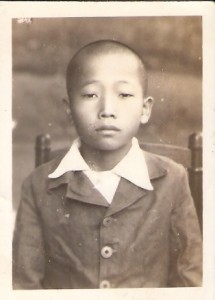 家父非常重視教育,就我所了解,他深深體會並相信教育是在社會上求上進的惟一管道。他本身是小學畢業的農夫和風水師,領悟到他人之所以當醫生或做地方紳士,靠的全是教育。因此既使我進入了正規學校就讀,他還是另有考量。小學暑假期間〈圖一〉,我們堂兄弟兩人,還得背上書包和米包,遠走林邊,求教漢文仙鄭玉波先生。在他的私塾內,拜讀台語「漢文」。從「寫信不求人」唸到「三字經」。還沒唸到「千字文」和「四書」時就被家父中斷,可能他感受到,整個社會畢竟是以官方國語做為獎懲標準。
家父非常重視教育,就我所了解,他深深體會並相信教育是在社會上求上進的惟一管道。他本身是小學畢業的農夫和風水師,領悟到他人之所以當醫生或做地方紳士,靠的全是教育。因此既使我進入了正規學校就讀,他還是另有考量。小學暑假期間〈圖一〉,我們堂兄弟兩人,還得背上書包和米包,遠走林邊,求教漢文仙鄭玉波先生。在他的私塾內,拜讀台語「漢文」。從「寫信不求人」唸到「三字經」。還沒唸到「千字文」和「四書」時就被家父中斷,可能他感受到,整個社會畢竟是以官方國語做為獎懲標準。
如是,我的一生就在中華民國的教育制度下長大。這個制度一開始就注重升學考試,它可說是中國科舉制度的翻版。學生在學習過程中,能自己理解多少就算多少,其餘大半靠記憶。老師也沒教什麼記憶技巧,靠的全是學生自己土法練鋼 ─「重復再重復」。算術與數學對我來講,比較靠理解;國文、物理、與歷史,理解與記憶參半;常識、地理、博物、英文、與化學等科,好像非大記特記不可。當時升學管道少,補習作風盛。在小學六年時,下午四點放學後還得留校補習,與其他同學睡教室地板過夜。一本「常識大全」幾乎被我背光,連「作文」也得背些如同「光陰似箭,日月如梭」似的樣板文句。好高興小學終於畢業了,得以遠到台南旅行,參觀赤崁樓(圖二,夾在前兩排中間坐有兩位,左邊那位示出帽子者是我)。但好景不常,緊接者就是一連串的升學考試。我是以第四十九名考入屏東中學(我還記得第一名是林省吾),我和我全家人、甚至全村都歡騰鼓舞。當時我也考上明正初中和屏東農校,但在師長的規勸下,我選讀屏東中學,因那是所省立的中學。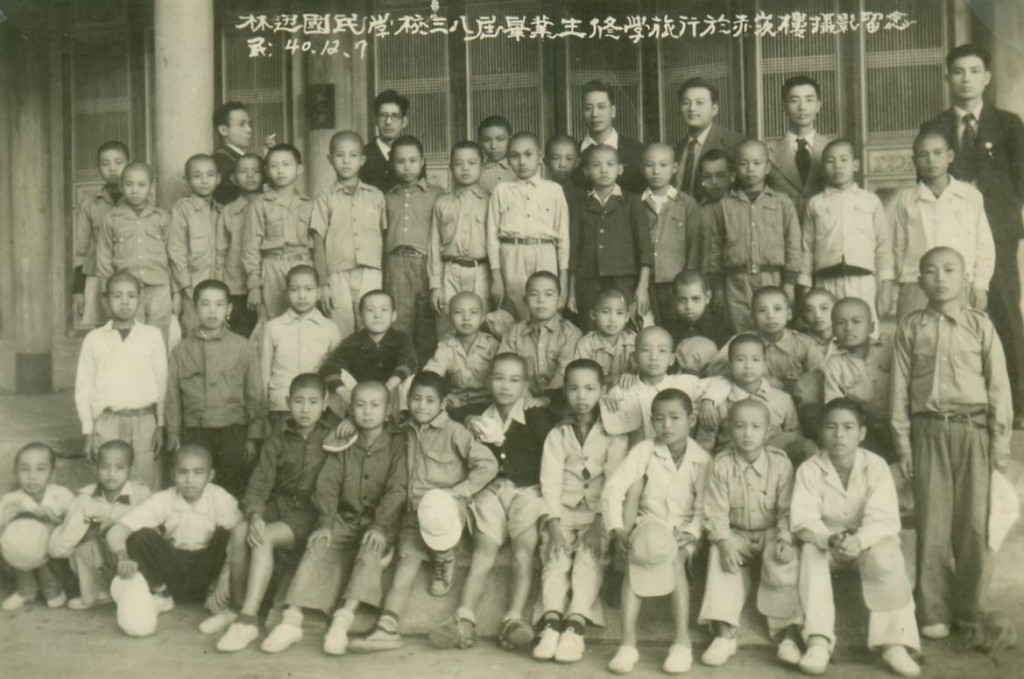
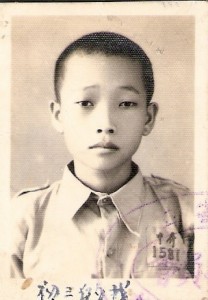 在我印象中,我的初中生活可說全在讀書 (圖三)。每天早上都得趕搭早上六點的火車,從林邊站到屏東站,時程約一小時多些。在車上,不管是站還是坐,都得手拿一本書,從頭啃到尾。下車後,還得趕緊排隊,步行三十多分鐘才到屏東中學校門口。每天上八小時課,每週六天。教學幾全注重視知識傳授,能背還是得背下去。在下午五點放學後,一樣地,得花上約兩小時,才得回到家。可能就因為這樣的不方便,我曾兩度短暫寄居在屏東市內的親友家。
在我印象中,我的初中生活可說全在讀書 (圖三)。每天早上都得趕搭早上六點的火車,從林邊站到屏東站,時程約一小時多些。在車上,不管是站還是坐,都得手拿一本書,從頭啃到尾。下車後,還得趕緊排隊,步行三十多分鐘才到屏東中學校門口。每天上八小時課,每週六天。教學幾全注重視知識傳授,能背還是得背下去。在下午五點放學後,一樣地,得花上約兩小時,才得回到家。可能就因為這樣的不方便,我曾兩度短暫寄居在屏東市內的親友家。
在中學階段,升學壓力一樣嚴重,由初中進入高中,照樣要升學考試。在高中,為了應付聯考,學校主動將體育、藝術、音樂等科目減量上課。課餘,有的上補習班的,不上的也得留校自補。一九五八年的大學聯考不分科,我考入師大教育系。這不是我的第一志願,現在也想不起我的第一志願是什麼。既然考上,也沒想要重考,只好<沒魚蝦也好>。考入師大,我歡欣,但不像考入屏中時那麼強強滾。一九六二年師大結業(圖四,我是中排,右起第五位)。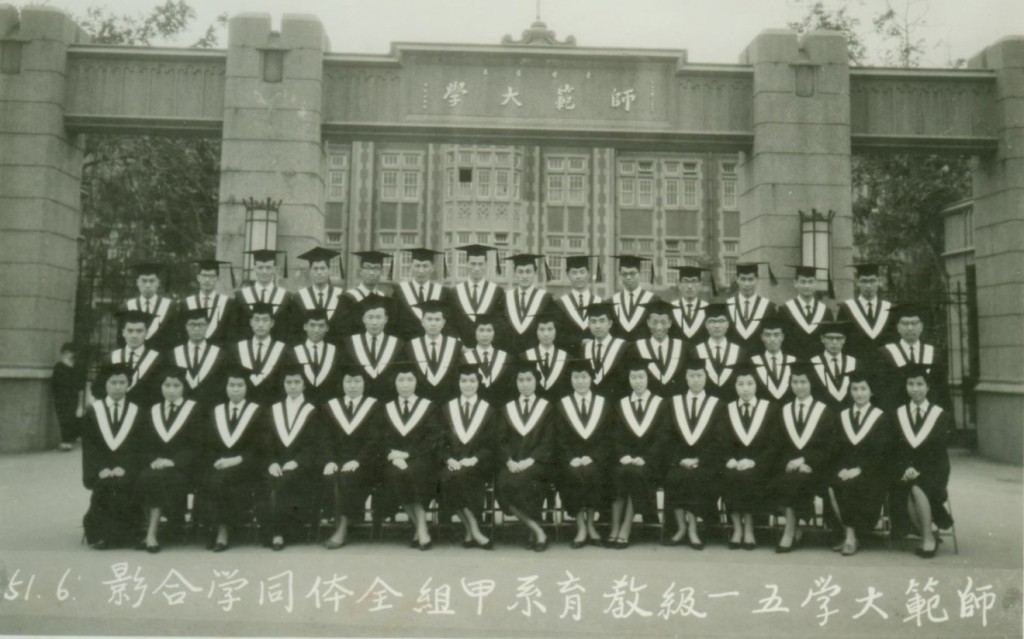 在實習一年後,隔年考上師大教育研究所和中國文化學院哲學教育研究所、以及自費留學考試。緊接者,我被徵入軍中服役一年。在一九六四年,我選擇自費到美國留學,不在台灣唸研究所。最後在一九七○年,我在加州大學洛杉磯校區(UCLA),取得諮商心理學博士學位 (圖五)。
在實習一年後,隔年考上師大教育研究所和中國文化學院哲學教育研究所、以及自費留學考試。緊接者,我被徵入軍中服役一年。在一九六四年,我選擇自費到美國留學,不在台灣唸研究所。最後在一九七○年,我在加州大學洛杉磯校區(UCLA),取得諮商心理學博士學位 (圖五)。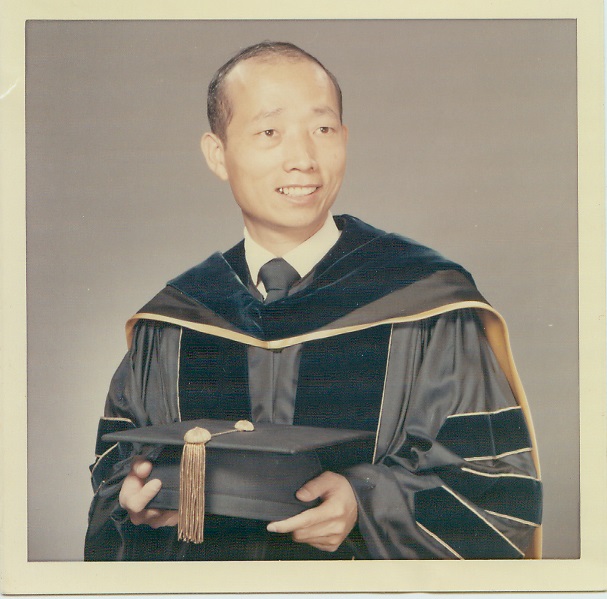
如此這樣的升學壓力對學生有何影響?我的答案有二:
第一個,那些會唸書與家境較好的人繼續往學校窄門鑽,但家境不好的,可就要被迫出局。記得小學畢業後,我班上三分之二走入工作界。到了初中和高中,又被刷兩次,每次出局者也將近二分之一。大學畢業後,如要考研究所,還要再被刷一次。社會競爭本是常態,如因學力不足而遭受淘汰則事小,但因家境則事大。如是後者,無形中會是國家人力資源的浪費。
第二個,在擠到大學甚至留學階段後,還有不少同學「學非所愛,愛非所學」。在大學時代,我就看到不少在初中畢業後擠入師範學校的同學,他們當起教師了卻放棄教職,重考大學,而所攻讀科系與本身才能興趣大相逕庭。我有位同學在初中班上是第一名,數理更是一級棒。可是他在師範學校畢業就職三年後,卻回鍋進入師大教育系,自己發現不對又高考轉進律師行業,現在充當律師。依我的觀察,他應是個科技人才;在師大,我也看到不少學生,發現所學不對再重考,就像一位數學系女生重考進入台大心理系;我到了美國,還看到不少已經千里迢迢來到美國的台灣留學生,唸了一半轉行或退學,再次顯現人力資源的浪費與個人的悲劇。我出國後雖然繼續唸教育心理,也在名校取得博士學位 ,但我不敢百分之百地說,我所學真的是我所愛與所能。第一,師大教育系並不是我的第一志願;第二,我似乎對電腦、哲學、演說、或數學也有興趣與能力,但卻在隨考逐試中,被一考定終生了。
在這裡,我看到美國與中華民國教育的不同。我的子女,在美國出生並受教育。我跟我父親一樣,不干預子女的學業選擇,這點可說一樣,但在學生各自選擇上,就不一樣了。就以我雙胞女為例,她們從不擔心沒有學校可讀,因是義務教育。到了高中時,就自動選讀些大學有關課程,自己申請學校,並參與SAT學科能力測驗。這測驗是全國性,如考不理想,可付費下季再考。美國一般有名大學看重這項成績,自設門檻,但可不是入學的唯一標準。我雙胞胎女兒,分別是高中第一與第三名畢業,分別申請UC Berkeley和UCLA。前一個被接收,後一個被拒絕。被拒絕者被UGA接收,但她只唸一年,就自轉到UVA。
另外,我發覺她們要唸那一系也很自由。在大學前兩年,都不必急立心願唸哪一科系。我唸UC Berkeley這位女兒算是特例。她自己在小學五年級時,就說長大後要當心臟外科醫生。高中時,自動訪問一些心臟科醫生,進入UC Berkeley唸與醫科有關的molecular biology。畢業後,進入UCSD醫學院。二○○五年是第二年,我問她將來要當那科醫生,她告訴我可能轉入Neurology科,兩年後,在即將畢業前夕,她說要到UVA醫學院當內科〈Internal Medicine〉的實習醫生。我訝異她轉變也勇於轉變,也不急於轉變。她的求學有那樣的選擇自由,叫我羨慕。
在此,我看到多少學子在中華民國教育體制下,因升學競爭,迷失了方向。我有位鄉親朋友,都已經留學美國取得博士學位,也當起名校教授了,後來卻教授不當,轉行到工業界。一個人在學業上走錯了方向,其對社會與個人的損失是無法估計的,因人生可只有一個青春!?
Got Lost in Competitive Schooling
Tender Lin, Ph.D.
As far as I can remember in my upbringing years, my family expected me the most was to excel in study. Prior to entering school, my parents enrolled me in an ungraded kindergarten with no classroom. We moved wherever we could sit, and sang Japanese children songs. It was just for a short period, as Japan lost the War. I enrolled in Linbian Elementary School, and started the Chinese education.
My father highly valued education. As I understood, he strongly believed that education is the only channel in social upward mobility. He was a farmer because of having only elementary education, but luckily my grandfather taught him another folk trade – hongshuei specialist. He realized that others achieved doctors or noblest status by having higher education. Therefore, at the early stage of my schooling, he enrolled me in another private class of mother tongue language too (Pic 1). Several years later, he realized that Mandarin became the dominant language; I was then dropped out of that private class.
I grew up in a Chinese educational system, which is a copy of long-time tradition. It focused on screening people through series of examinations. In our schooling, rote memorization took precedence over conceptualization. How much we understood the subject matter was completely up to us. Interestingly, we weren’t taught how to better memorize either, all we did were to repeat, repeat, and repeat. We better tried to memorize the right answer to every question, so that we could pass the examination.
For me, Chinese, Physics, and History required half conceptualization and half memorization; Common Sense, Geography, Biology, English, and Chemistry demanded total memorization. In addition to regular classes, we also had to attend extra curriculum classes because of intense entrance competition. Sometimes, we even slept at classroom floor overnight. To my surprise, I could memorize the whole text of “Collections of Common Sense”, and was fluent in memorizing Chinese expressions such as “time runs like lightening speed.”
Prior to graduation in 1952, I was lucky to join the graduation trip to Tainan. Out of some 120 graduates, only few of us got to go (Pic 2). Tainan is a cultural city, and it is a dream city for all of us, country boys. After the trip, we all studied very hard again for the middle school entrance examinations. I was proud of myself, as I passed three of them: Pingtung Middle School, Mingcheng Middle School, and Pingtung Agricultural School. I choose to attend Pingtung Middle School, as it is the provincial and highly competitive. I was ranked the 49th at entrance examination of that school.
From my impression, I spent all of time in study at Junior-High-School years (Pic 3). Every morning, I got to catch the 6AM morning train from Linbian to Pingtung for about one hour. Regardless I got seat or not, I got to hold a book to study. Once got off train, we were required to line up and marched to school for about 30 minutes. We attended classes eight hours a day and six days a week. School teaching almost focused on knowledge transmission and we were asked to remember as much as we could. School closed around 5PM. We then hurriedly got back home with another two-hour journey. Because of this inconvenience, I twice stayed at friend’s house in Pingtung for a short period of time.
In my six years of middle school, pressure of entrance examination still hovered over my head. The first one was from junior high to senior high, and the second one was from senior high to college. During senior high school years, just because of no college examination on Art, Physical Education, and Music, subsequently we hardly had any class on them. In1958, I passed the college entrance examination, and I was distributed to the Department of Education at Taiwan Normal University. Although she was not as famous as National Taiwan University, she was not as poor as many others. I decided to stay.
I enjoyed my four yeas of college life. In 1962, I graduated (Pic 4), and subsequently I took a teacher intern position at Linbian Junior School. A year later, I passed another two graduate school entrance examinations, and one oversea study examination. Then, I was drafted into army for one year. In 1964, I choose to come to United States for further study. Finally in 1970, I obtained a doctoral degree in counseling psychology from UCLA (Picture 5).
How did these intense entrance examinations have on students’life? Here are my answers:
First, only those who are academic smart and financially adequate got to continue their education. In my graduate classes at elementary school, it was about two third of them getting to the world of work. In my graduate classes at junior high school, there were about one half of them dropped out of school, so did my senior high school graduates. Only few of the college graduates got to attend the graduate school. I realize that competition is a social norm, but I feel it is big national loss if its people can not attend school not because of his abilities, but because of his lack of money.
Second, even after getting into college and/or oversea study, a quite few of students still do not like their study. In my college years, many of my junior high school classmates gave up their elementary school teaching position. They came back to college but studied at the subject irreconcilable with their interests and abilities. For example, Mr. Su was a top-notch student in my class, particular excelled in math and physics. He got into Normal School and became primary school teacher. He did not like it, and found way to get back to Department of Education at Normal University. He did not like that choice either. He studied hard and became a lawyer. In my opinion, that is what his talent at either. He could be a very good scientist, but the door closed up on him due to mismatch in schooling. I also noticed a lot of students changed their major or retake the entrance examination. Also a lot of them changed their major or even dropped out of college, even they had come to United States. All these are personal tragedy and a loss to national resources.
For myself, I came to United States and continue to pursue my major in educational/counseling psychology. In 1970, I got my doctoral degree from a reputable university, but I wasn’t 100% sure that is what my talent is. It is because (1) my major in Education at Taiwan Normal University was not my first choice, (2) I have special interest/ability in philosophy, math, computer science, and speech, but I was channeled into Education via College Entrance Examination.
Here, I see the difference between USA and Taiwan in education. Take my children’s education as examples. My father and I all respected children’s educational choice, but how children make their choice are different. I did not have much choice, but my twin daughters were different. They grew up in USA, and they never have to worry about no school to attend, as education is compulsory up to high school level. I saw them studying college preparatory courses while in high school. They took SAT, and applied the colleges they want without declaration of major. They were ranked 1st and 3rd in high school class. One was accepted by UC Berkeley, one was rejected by UCLA. The latter one finally was accepted by UGA, but she then transferred to UVA a year later.
Besides, I found my twin daughters were free to choose their majors. Even at their junior year, they still did not have their major. My daughter Chris was most particular. Right at 5th grade, she already said she wanted to be a heart surgeon. At high school, I even took her to interview several local heart doctors. Upon entering UC Berkeley, she chose molecular biology as major, and later pursued her medical education at UCSD. During her second year, I asked her what her specialty was. She wasn’t sure, but mentioned neurosurgery a possibility. At the day of graduation, I noticed she is going to UVA medical school for intern in internal medicine. I was surprised at her courage and pace in change specialty, and I envied.
In summary, so many students lost their direction from the educational system in Taiwan. Give you one more example again. One of my close friends from elementary through high school years got his doctoral degree from first class University at USA. He was then employed at a first class University as assistant professor. For some reason, he quit his teaching and got into industrial work. He was forced to separate from his family as they lived thousand miles apart. If one mismatched his schooling at youth, it could cause tremendous loss both to him and to society, as there is only one youth to live on.
Source from Prof T. Lin’s book, “Life Asks, I Answer (I) 命問我答”, published by Amazon.com. 09/2014
Posted in 02/2015

